It’s been quite a while since my last retrospectives series (more than 3 years now), but that’s largely because of the sheer amount of work that goes into these things. Not only do I have to make time between work, family, and other hobbies to be able to watch 3+ movies, I also have to do research into the the production history of the franchise, and actually write out the reviews for each movie… I’m not complaining, I really enjoy doing this stuff, but I also get paid jack shit for it so it takes a lot for me to get the motivation to put one of these out (it’s also why I’ve largely pivoted to the less labour intensive Love/Hate format for most media franchise overviews these days).
Anyway, all that said, I want to make it clear that I’m fucking excited for this look at the Left Behind franchise. Growing up evangelical, I was really into the book series… because fuckloads of people die in it. I’m not even kidding, that was the entire appeal for little edgelord me at 10 years old (the massive disasters and demons running rampant were also super cool). It simultaneously managed to get me into end-times theology, and also eventually made me realize that the whole industry that built up around it was a grift. Despite having a massive grudge against this franchise and the poison it has been for Christianity as a whole, I’m going to give each film a fair shake and recount the batshit insanity that went on behind the scenes with each new film. So let’s start at the beginning, with Left Behind: The Movie, which I actually thought was pretty decent when I was a kid. Does it hold up still, now that I’m a jaded, crusty old bastard? Read on to find out…
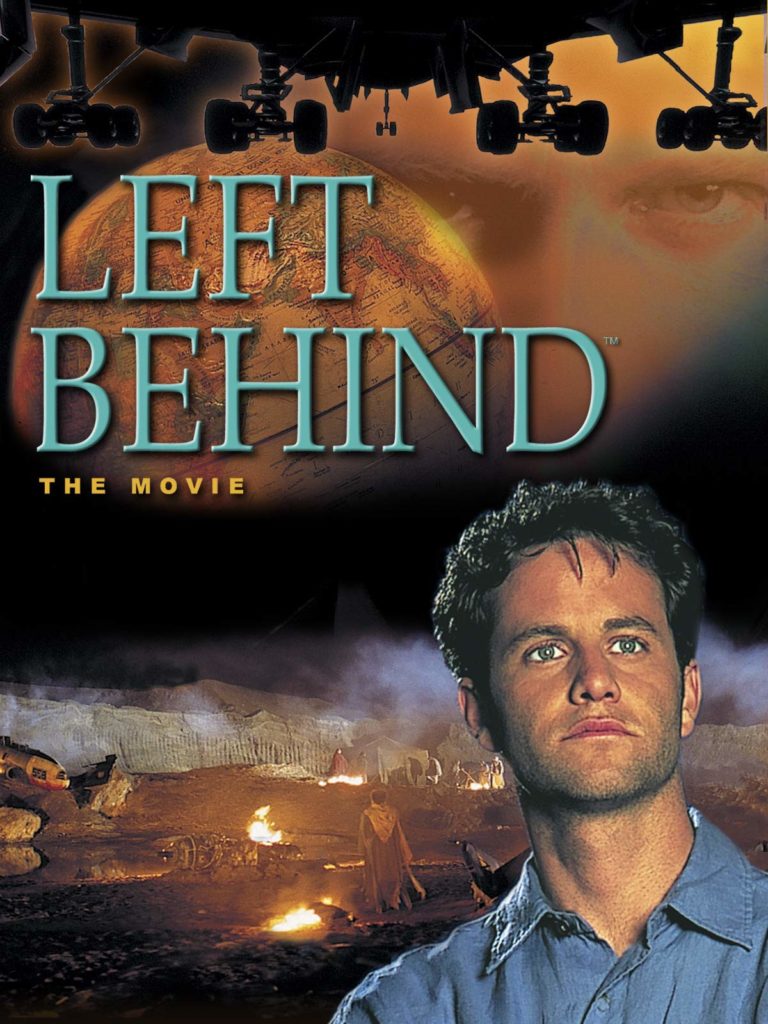
Production
If there is one man most responsible for Left Behind, it is Tim LaHaye (take of that statement what you will). LaHaye was a pastor in the mid-1950s before becoming an instrumental force in the conservative evangelical movement in America in the 70s and 80s. He, along with Jerry Falwell, were instrumental in establishing and directing the Moral Majority, the movement which caused Ronald Reagan to be elected to office and, among other things, created the cultural environment that would allow the Satanic Panic to occur.
Basically, this motherfucker is the reason why America is so fucked up today.
Anyway, LaHaye was on a flight in 1994 and witnessed the pilot (who, apparently, was married) flirting with a flight attendant, which caused him to begin imagining how he would react if The Rapture occurred at that very moment. He quickly teamed up with Christian writer, Jerry B. Jenkins, and the pair conceptualized Left Behind, which would follow a large cast of characters trying to survive and save as many people as possible during the final seven years of Earth in the evangelical Christian apocalypse. The pair drew heavy inspiration from A Thief in the Night, a series of apocalyptic thriller films released in the 70s and 80s, which also portray a post-Rapture world. By all accounts, LaHaye provided his ideas and theology for the structure of the story, while Jenkins did all the actual writing. Notably, LaHaye’s influence can also be felt in some of the more… interesting decisions in the book. Notably, a lot of the first book’s plot is driven by shadowy “international bankers” influencing the UN, which has way more power than it does in real life… then you realize that Tim LaHaye is obsessed with the Illuminati, and this just reflects what he thinks is actually going on in the world. Similarly, LaHaye believes that Catholics are a bunch of heretics, so most Catholics are not Raptured. Oh, and as an extra “fuck you” to Catholics, the Pope gets Raptured… because he dropped his Catholic beliefs and adopted evangelical doctrine. And then, later in the series, the new pope abolishes Catholicism for a new one-world religion and, when he dies, his memorial is cancelled because no one gives a fuck about him, ouch.
Left Behind was released in 1995, and would be a run-away success, with selling millions of copies, and reigniting an evangelical obsession with eschatology as the new millennium drew nearer. A new book would follow every year (some years, 2 new books!), for a grand total of 16 main series entries by 2007, plus countless spin-offs and merchandise, not to mention a cottage industry of prophecy-based media which polluted Christian bookstores for decades.
As early as 1997, Jenkins and LaHaye began shopping the series around to movie studios interested in adapting the books to the screen. Namesake Entertainment optioned the rights from LaHaye and Jenkins, promising that they would be able to make it into a big-budget blockbuster series. Namesake seemed like a good fit for LaHaye and Jenkins, because they specialized in adapting Christian thrillers for screen. With Ralph Winter on-board to produce (known for X-Men, Fantastic Four, and… that Planet of the Apes movie), things were looking promising for Left Behind (even if its script was being written by Alan B. McElroy, the guy who wrote Halloween 4, Spawn, and the goddamn Tekken movie). Unfortunately for all involved, Namesake were unable to find a studio interested in financing the movie, so they licensed the rights to Peter & Paul Lalonde at Cloud Ten Pictures, a Canadian production studio making end-times films for the evangelical market. At this time, they had already made a micro-budget trilogy called Apocalypse (whose entries feature goddamn Mr. T, Gary Busey, Jeff Fahey, Margot Kidder, and Howie Mandell, what the actual fuck!?), so apparently they were the best people for the job. Despite being prominently credited on the film (and its sequel), Ralph Winter and McElroy didn’t have any actual role in the production, and it’s believed that their names were included because it granted the film more legitimacy.
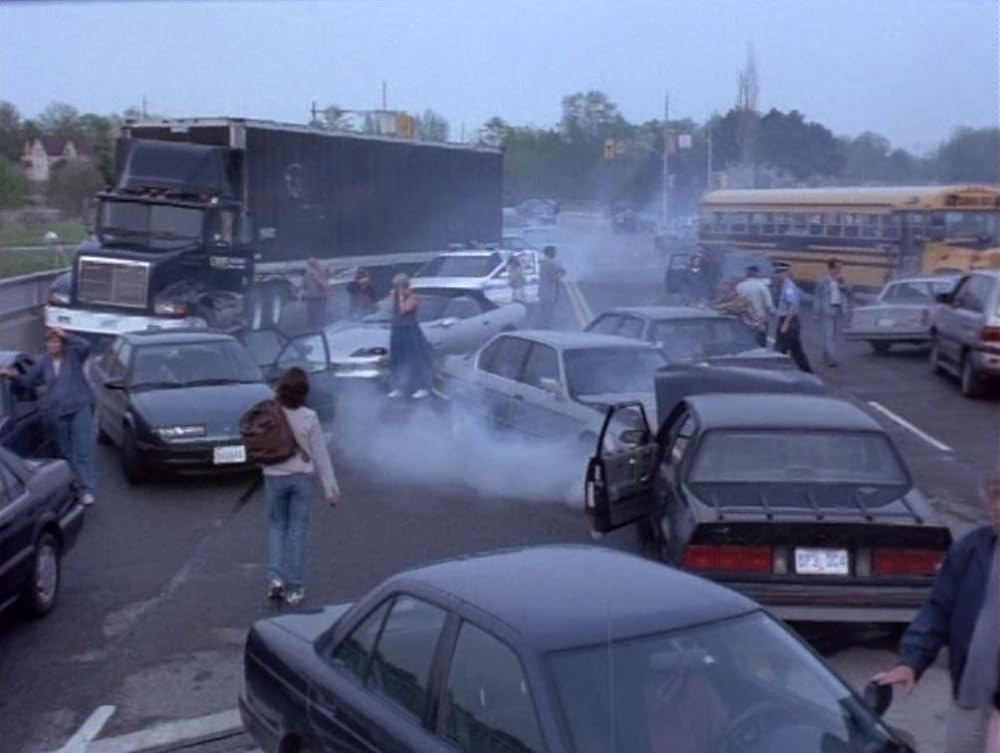
Y’know who didn’t want their names on the film? Tim LaHaye and Jerry B. Jenkins. They had sold the movie rights on the promise of getting a $40 million Hollywood blockbuster that could compete with the secular market. Instead, they got a film directly marketed to the Christian community with a reported budget of $17.4 million (which, according to the producers, made the film the most ambitious Christian movie of all time), although LaHaye stated on-record that “representations about the size of the budget were not true”. It seems that this was especially contentious for LaHaye and Jenkins because they had, for whatever reason, sold the exclusive film rights to their entire franchise to Namesake in their original deal – not just the books which had been written at that point, but also future novels, and the Left Behind: The Kids young adult series, which they seemed particularly keen to reclaim the rights to. LaHaye and Jenkins had planned on making their own adaptation of Left Behind: The Kids, which was unable to proceed due to the rights agreement.
In July of 1999, before the movie even came out, LaHaye sued Cloud Ten for breach of contract, claiming $10 million in damages. He offered to drop the suit if Cloud Ten and Namesake relinquished their rights to Left Behind: The Kids and gave up their rights to any further Left Behind books. This was not going to happen though because Namesake were developing their own television series based on Left Behind: The Kids (which never came to fruition, probably due to this lawsuit) and, despite offering revenue sharing to the authours, LaHaye would not budge. This lawsuit would drag on for several more years (and movies), which we’ll cover further in their own entries…
Meanwhile, development of Left Behind: The Movie proceeded in spite of all the drama surrounding it. Vic Sarin, a Canadian, long-time, workman director and cinematographer was brought on to direct the film. Of the principle cast, the highest-profile cast member was Kirk Cameron, who was known for being on Growing Pains and then converting to evangelical Christianity and going off the deep end. He, along with wife Chelsea Noble, were very much true-believers, and actively sought to become involved in the films after reading the books. Cameron was cast as co-lead Buck Williams, a high-profile journalist, while Noble was cast as The Whore of Babylon. The other co-lead role went to manly-man Brad Johnson, who played Rayford Steele. The role of Nicolae Carpathia went to Gordon Currie, who had a small role in Jason Takes Manhattan (he’s the poor son of a bitch who gets chucked off the mast and gets impaled on the radio antenna). Rounding out the main cast were Janaya Stephens as Rayford’s daughter, Chloe Steele, and Clarence Gilyard Jr as Bruce Barnes. Fun fact, the role of Chloe Steele was originally going to go to Hallmark movie queen, Lacey Chabert, in what would have been one of her first film roles, but she ended up dropping out due to scheduling conflicts.
Filming took place in and around Toronto in May of 2000 and lasted for 31 days. For the opening sequence of the film, which takes place in Israel, the production used a quarry and made some camels walk around in the background to make it look like the Middle East. I mainly mention this because literally my first note when I was watching the movie was that the camels were extremely conspicuous and that “Israel” looked like a quarry, so it was hilarious when I found out that these observations were indeed correct.
Left Behind: The Movie would take an unconventional release strategy. It originally was released straight to DVD in 2000, with a theatrical release following in February of 2001. Its theatrical run was not particularly great, grossing only $4,224,065.
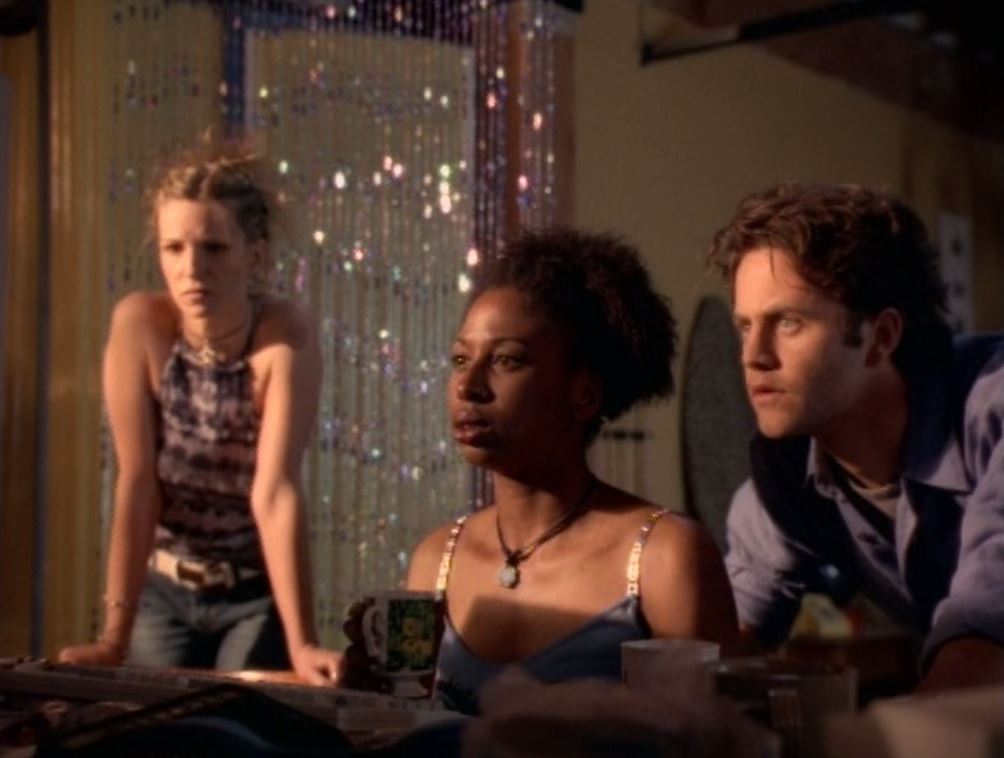
Plot Synopsis
The film opens in Israel, where GNN television reporter Buck Williams is interviewing scientist Chaim Rosenzweig, who has developed “Eden”, a formula which can allow food to grow in desert environments. This formula has poised Israel to become a global leader as they hold the key to solving a growing food scarcity crisis. However, the interview is cut short as Arab and Russian jets launch a surprise attack on Israel. The pair flee into a bunker and watch the unfolding attack. However, the attacking forces begin spontaneously exploding before Israel can scramble a response, which causes Buck to run outside to document and report on the miraculous happenings. Within moments, the entire raid is thwarted and Israel is saved by mysterious forces.
We then follow airline pilot Rayford Steele, who bails on his son’s birthday party in order to take over a flight from New York City to London, much to the distaste of his daughter, Chloe. Aboard this flight is Buck, who is looking into the attack on Israel after being tipped off by a contact of his, and Hattie Durham, a flight attendant who Rayford is having an affair with. However, she reveals to Ray that this is her last flight, she will be taking a job with the UN, in part because she feels like he has just been leading her on.
While over the Atlantic, passengers begin to realize that several people aboard have disappeared, including all of the children. Bruce, Hattie, and Buck struggle to maintain order aboard, while Rayford diverts the flight back to New York. They soon discover that these disappearances are a global phenomenon and that hundreds of millions of people have vanished without warning, causing several deaths due to vehicles having their operators disappear, amongst other things. The flight ends up diverting to Chicago. Rayford is thankful for Buck’s help during the flight and Buck convinces Rayford to link him up with a private pilot who can get him to New York City. He stays at Rayford’s home for the night.
Rayford returns home to discover that his wife and son are gone. He realizes that his wife, who he had resented for converting to Christianity, was right all along. Meanwhile, Chloe returns home, having had her vehicle stolen while trying to head to college for her exams, before being unable to continue due to all the wrecked vehicles littering the roads. Chloe takes Buck to the airport, where he links up with Ray’s contact, pilot Ken Ritz, who agrees to take him to New York. When he arrives there, he finds that his contact, Dirk Burton, has been killed for knowing too much. Buck gets his confidential files and then flees when a sniper tries to kill him as well. He discovers a plan orchestrated by international bankers, Jonathan Stonagal and Joshua Todd-Cothran, who intend to use their protégé, UN Secretary General Nicolae Carpathia, to entice Chaim Rosenzweig to hand over the Eden formula to the UN in exchange for plans to reconstruct the Jewish temple. They will then bankrupt the UN and control the world’s food supply, netting themselves untold billions in the process.
Rayford travels to new Hope Village Church and discovers that its pastor, Bruce Barnes, has been left behind. He had preached for years, but never really believed until now. The pair set about preparing for the coming tribulations.
Meanwhile, Buck returns to Chicago and meets with CIA agent Alan Thompkins to try to get information about Stonagal and Todd-Cothran’s plans. However, Thompkins is killed in a car bombing and Buck flees to Rayford’s home once again. They take Buck to New Hope Village Church in order to utilize the medical services running out of the building. Rayford and Bruce show Buck a tape that the former lead pastor had made, which predicted the disappearances, the rebuilding of the temple and the rise of the Antichrist. Buck doesn’t believe them, and leaves to go to the UN to warn Chaim about Stonagal and Todd-Cothran’s plans.
When he arrives, he soon finds that every prediction that he had been told by Rayford and Bruce were true and converts to Christianity in order to protect himself against the Antichrist’s machinations. Nicolae calls a private meeting, where he reveals his plans to consolidate power and then executes Stonagal and Todd-Cothran, before using mind-control to cause everyone (except Buck) to believe that they committed murder-suicide. Buck returns back to his new friends and they all agree to band together to fight the coming evils…
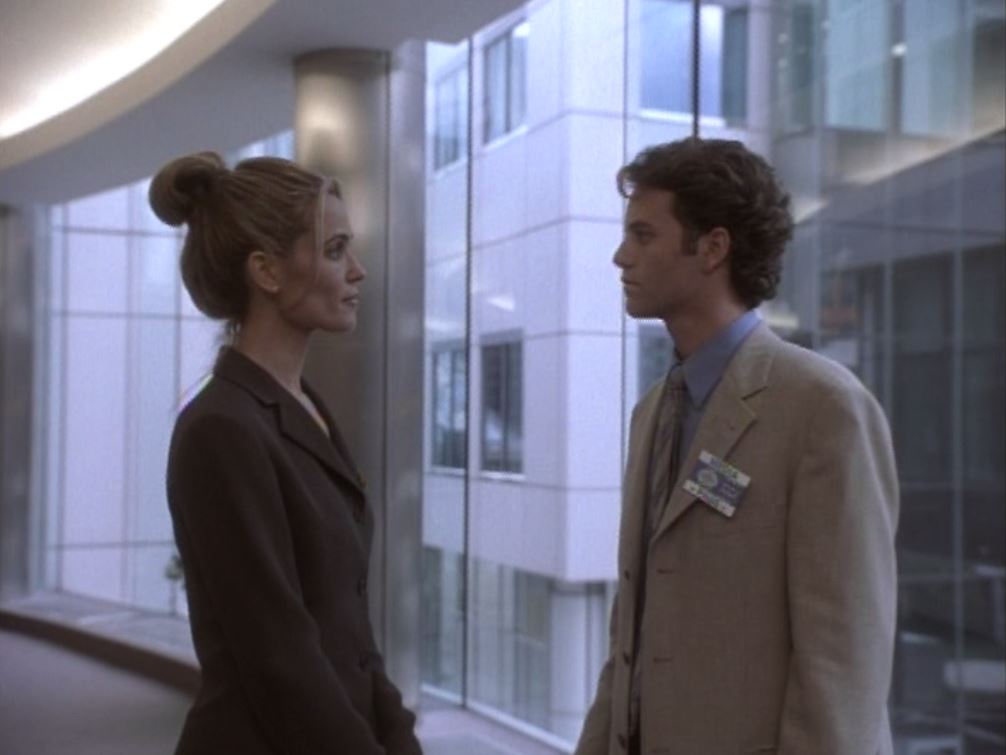
Review
So, this might be a hot take, but here goes: Left Behind: The Movie isn’t all that bad. No, I’m not kidding. I remembered thinking the movie was decent when I saw it more than 20 years ago, but my opinions on eschatology and movies have changed since then, so I was expecting to like it a whole lot less. While I definitely have my issues with it, my estimation of it hasn’t dropped that far compared to where it was. It also probably helps that I’ve made a hobby out of seeking out and writing my thoughts on shit movies, so in comparison Left Behind: The Movie doesn’t even come close.
Now, a caveat to this – if you have no interest in religion, then Left Behind will probably not do anything for you. Similarly, if you can’t set aside a distaste for the creators’ theology, then it’ll also sour your experience. If you can lay that aside though and just go with it, Left Behind: The Movie is an alright thriller, buoyed significantly by its strong premise.
I’ll keep the positives going with probably the strongest aspect of Left Behind: The Movie – its cast. Christian movies, especially in this era, were known for having amateur-level acting, but Left Behind‘s cast are fairly solid across the board (even Kirk Cameron, although he and Chelsea Noble put in the weakest performances of the main cast, in my opinion). Easily the two standouts are Brad Johnson as Rayford Steele and Gordon Currie as Nicolae Carpathia. Johnson is a consummate professional, effortlessly taking Rayford from seething and resentful of his wife, to controlling and in-charge as a pilot, to desperate and downtrodden when he discovers his family has disappeared, to truly convicted in his beliefs when he converts. The only problem is that his arc ends too early and he spends the last forty minutes of the film with nothing to do but preach at the audience (I found a contemporary review by a Christian who saw the movie who agreed that Rayford was the best character, but opined “he comes off as a Bible-thumping turnoff after he’s saved, and delivers the usual ‘there’s something bigger than all of this’ kind of talk”).
Meanwhile, Gordon Currie gets to chew the scenery as Nicolae Carpathia, going from seemingly-good natured, to slimy and sinister on a dime. The reveal that he’s the Antichrist is extremely obvious from the moment he appears in the film, but when they do reveal it, it’s really effective scene where Currie absolutely commands the room. Hearing him say “Don’t worry, this will be completely painless. After all, I’m not a monster” and then chuckling to himself is downright chilling. This might be another hot-take, but I feel like Currie’s Nicolae is, low-key, an all-timer villain. That might sound crazy considering that I’m talking about a series of micro-budget Christian films, but these novels and movies have a hold in the imaginations of the evangelical market. There are millions of people whose conception of an Antichrist figure is exactly what Currie portrays: a wolf in sheep’s clothing, a leader who preaches peace, but who has sinister intentions. This portrayal is so ingrained in their thoughts that, when a figure who arguably fits the theology of who an anti-Christ figure is better, they enthusiastically vote for that guy three times.
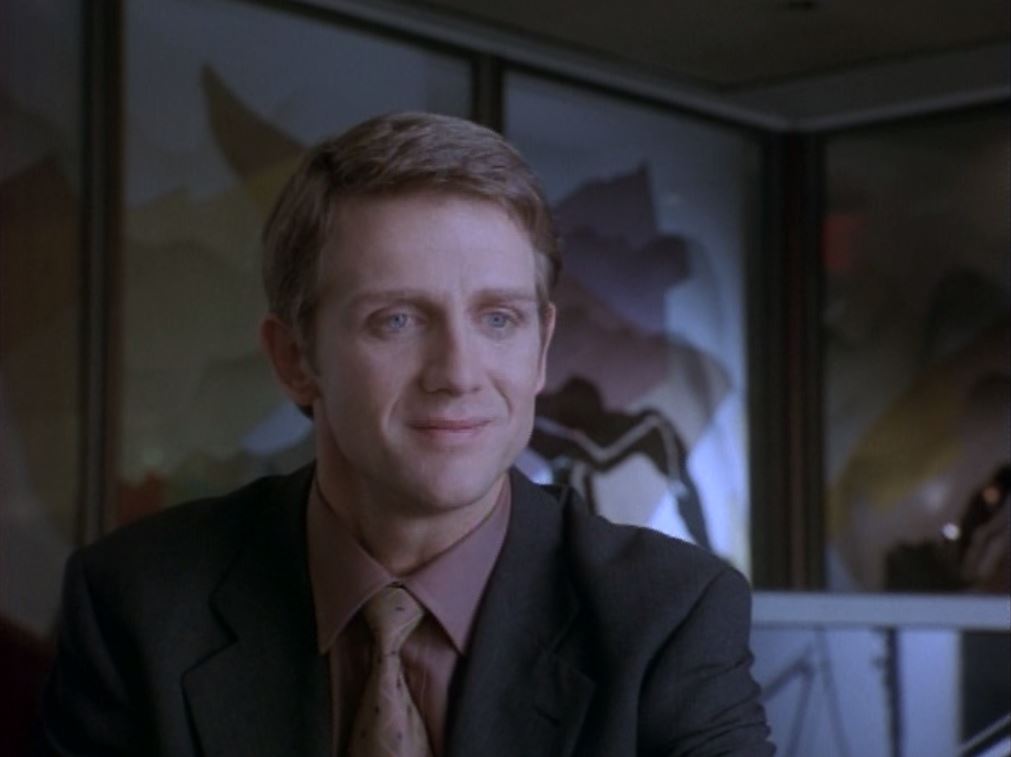
The other main strength of Left Behind: The Movie is its overall premise and plot. It also has to be said that the movie is a whole lot better than the novel it’s based on. Where the novel can be meandering and poorly written, the movie tightens everything up into a (mostly) well-paced thriller. While the Rapture itself is a compelling enough event to mine a lot of drama, it’s over fairly quickly and the film needs more events to keep you watching. Think about it a bit: if this movie was just about The Rapture, then the natural progression for acts 2 and 3 would be a massive amount of preaching to the audience. The main reason the film is able to sustain interest after the Rapture is its B-plot, which features Buck Williams uncovering the conspiracy to take control of the world’s food supply, which eventually results in the rise of the Antichrist. While nothing particularly special or unique goes on in this B-plot that you haven’t seen in any other conspiracy narrative, this storyline stays interesting with a cavalcade of assassinations, clues, and near-misses, keeping it constantly moving forward and engaging (dare I even say “exciting”?). It all culminates in probably the best scene of the movie, where Nicolae is revealed to be The Antichrist and Buck realizes he’s trapped in the same room as him. It’s a really tense scene, with Nicolae dispatching Stonagal and Todd-Cothran in cold blood and then using his mind control super powers to tell everyone assembled what he’d like them to believe (except, Buck, who is protected by the power of God). It effectively hypes up the real danger Nicolae presents going forward and gets you properly interested to see how the characters will deal with him in future… until you read the books and find out he’s constantly getting clowned on, because they can’t just let their symbol of ultimate evil ever win.
That said, there’s one glaring issue with this film’s narrative structure and pacing, and that’s how Rayford’s arc is handled. If Buck’s journey is the B-plot, Rayford’s storyline is very much the A-plot for most of the film as he deals with the fallout of the Rapture and then tries to cope with the disappearance of his wife and son. However, after about an hour he realizes they were right, converts to Christianity, and then becomes a die-hard believer from that point onward… with about 40 minutes left to go in the movie. Like, the movie cuts back to him every once in a while, but there isn’t much for him to do, other than preach at Buck, Chloe, and the audience. I can’t help but feel that the movie would have been stronger overall if Rayford spent more time struggling, or maybe went through a period of anger at God for taking his family away. Then, maybe he could have learned about the Antichrist from Bruce Barnes at the same time as Buck.
And with that, we can dovetail into the things that Left Behind does not do so well. It really pains me to say this, but Tim LaHaye was right about something – this movie is cheap as fuck. Like, I know that people will say all sorts of things in a legal battle to try to sway the narrative, but I actually believe Tim LaHaye when he says that the film’s widely-reported $17.4 million budget is an exaggeration (and, adjusting for inflation, that would apparently be closer to $30 million today, which makes this even more insane to me). I’ve seen estimates that put the budget around $4 million, and I find that far more realistic considering what we got on-screen. Tim LaHaye has also gone on record saying that Cloud Ten’s productions look like “glorified church basement movies” and, oh my God, it’s a pretty apt description. Most of the film takes place in very simple sets – Ray’s home, a warehouse, a plane set, some office buildings, a UN set. They’re functional, but considering that we only get a very small handful of outdoor sequences, and they’re pitched as the “big” money-shot sequences (eg, air terminal chaos, Chloe coming across the car wreck, the car bombing), it underscores this film’s low production values. It also doesn’t help that the lighting in the film is absolute ass for most of the runtime, which is probably the largest contributing factor to why this movie feels so amateurish.
The absolute worst offender though is the aforementioned opening scene in “Israel”. As I said in the Production section, the second I saw that camel in the background I thought “Oh man, they clearly are NOT filming this on location, it looks like a quarry”. Then there’s the CGI of the planes and tanks during this sequence, which was poor even by year 2000 standards. I’ll give them some credit – there are some pretty good practical explosions during this sequence, almost enough to make you not realize that Buck and Chaim go into some random goat herder’s house, and suddenly are in a state-of-the-art military bunker. It’s pretty clear that most of the budget and ambition went into this opening scene, because it is miles beyond anything else in the film… but would it have taken up a good chunk of $17.4 million in the year 2000? I strongly doubt it.
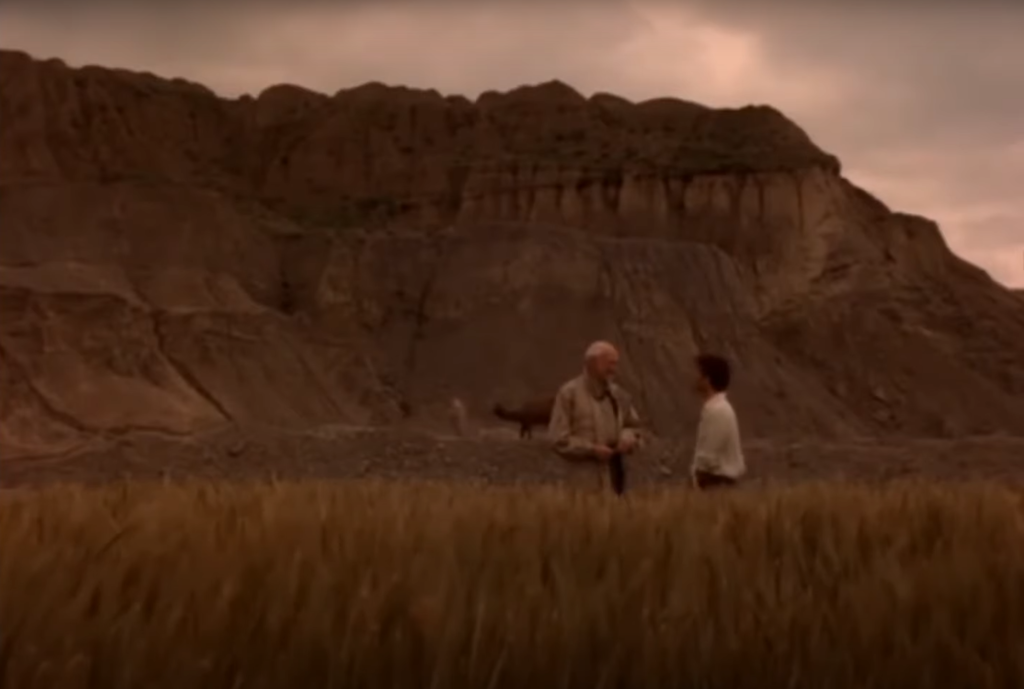
Left Behind is better than the book it’s based on, but there are fundamental issues which can’t really be excised in adaptation. Even as a child reading these books, one of my greatest frustrations was a deep-rooted lack of imagination on the part of the authours and the people inhabiting their world. Let’s look at an example to illustrate what I’m referring to here: as the attack on Israel gets underway, the skies suddenly darken, going from the middle of the day to black as night. In any other movie this could be construed as “passage of time”, or (potentially intentional) “continuity error”, but here it’s clearly intended to convey the intervention of God. However… no one comments on it. It’s supposed to be the middle of the day, but for whatever reason in Israel it suddenly became night time, defying meteorological explanation. And then all the planes begin exploding and everyone is just dumbfounded… and I do mean “just”, because there’s no explanation or speculation presented. Buck’s driving force for a good chunk of the movie is “Wow, I sure do wonder what happened there in Israel?”, but he seems to be the only one who cares, and the the whole question gets quietly dropped pretty soon in the movie. It’s not even like the world didn’t see this happen, it was literally being televised, but there’s zero impact beyond this scene. Like… are you telling me that there wasn’t a sizeable contingent of people going “That sure looks like it was divine intervention”?
Of course, the response to the Rapture falls into the same issue. “Huh, every non-Catholic Christian and child under thirteen in the world disappeared in a manner like the mythical rapture some evangelicals believed in. Wonder what happened, radiation maybe?” That last part isn’t even a joke either, radiation becomes the “official” explanation for what caused the disappearances, even though any moron could look at the demographics of the people who disappeared and find correlation showing that it was not random. One character believes that aliens were behind the disappearances (which, honestly, would probably be the second most obvious answer), while laughing about the idea of it being the Rapture, but that just underscores the issue – if they have information about the Rapture, it kind of defies explanation that they wouldn’t see that this miraculous event was anything other than that and instead handwave vaguely to “radiation” without any evidence. To me, this reveals a few potential insights into the authours’ opinions on the average non-Christian:
- Charitably, they might believe that God is “hardening their hearts” like the Pharaoh in Exodus, so that they cannot accept the obvious truth. If so, it’s kind of fucked up that God would then put them into this “final chance for redemption” and then take away their chance to see truth.
- They believe that the signs of God really are as obvious as they are portrayed in this movie and non-believers are just oblivious idiots. Hate to break it to them, but if we lived in a world God blew up an entire army and then caused hundreds of millions of children and Christians to disappear, there’d be a lot more converts, because then there would be some actual, concrete evidence for the supernatural.
- They believe that non-believers are actively looking for any excuse to defy God. Considering that “there are no real atheists” is a common belief amongst fundamentalists, this wouldn’t surprise me too much.
While I think that any (potentially even all) of these options are true, there’s also a much simpler explanation which could also be true: Jerry B. Jenkins is a hack writer who ignores any potential impact to the world because it interferes with the story he’s trying to tell… despite that story being one where the entire world’s population is undergoing countless disasters, the massive consequences of which should be being felt and responded to. There is so much impossible shit that happens in these books: in this first movie alone, completely ignoring full-on supernatural intervention, we have Israel magically developing technology to make the deserts fertile in order to become a global superpower. Kind of a weird plot point, until you realize they only did this because they believe it to have been prophesized. Our prophecies say that there will be a one-world currency? Guess we’re gonna make Korea join the EU now. Maybe this felt more realistic in the late 90s when the European Union was just taking form, but 20 years later in the wake of Brexit, this idea is laughably optimistic. And don’t even get me started on Israel rebuilding their temple, which even the movie acknowledges is impossible without the aforementioned magic and some handwaving to reveal that the temple can actually be built somewhere else… again, because their prophecy says that it has to happen, so by God they will force it to, then yada yada through the details and have everyone accept it. Oh, and this is also in a world where the UN basically rules the world already, which starts to make sense when you realize that Tim LaHaye believes in the Illuminati…
Underscoring all of this, I’ve always found it ironic that the existence of Left Behind makes the entire scenario even more impossible. Like, the premise of the books kind of works if the Rapture remains this weird thing that some evangelicals believe in, so you can see why some people wouldn’t immediately go “oh shit, the Rapture just happened!” if everyone suddenly disappeared. However, Left Behind was such a cultural juggernaut and has become so ingrained within the evangelical zeitgeist, that the idea of a Rapture occurring and not causing most people to immediately logically conclude that is laughable, let alone the idea that hundreds of millions of people would willingly go and tattoo themselves with 666 in light of all this.
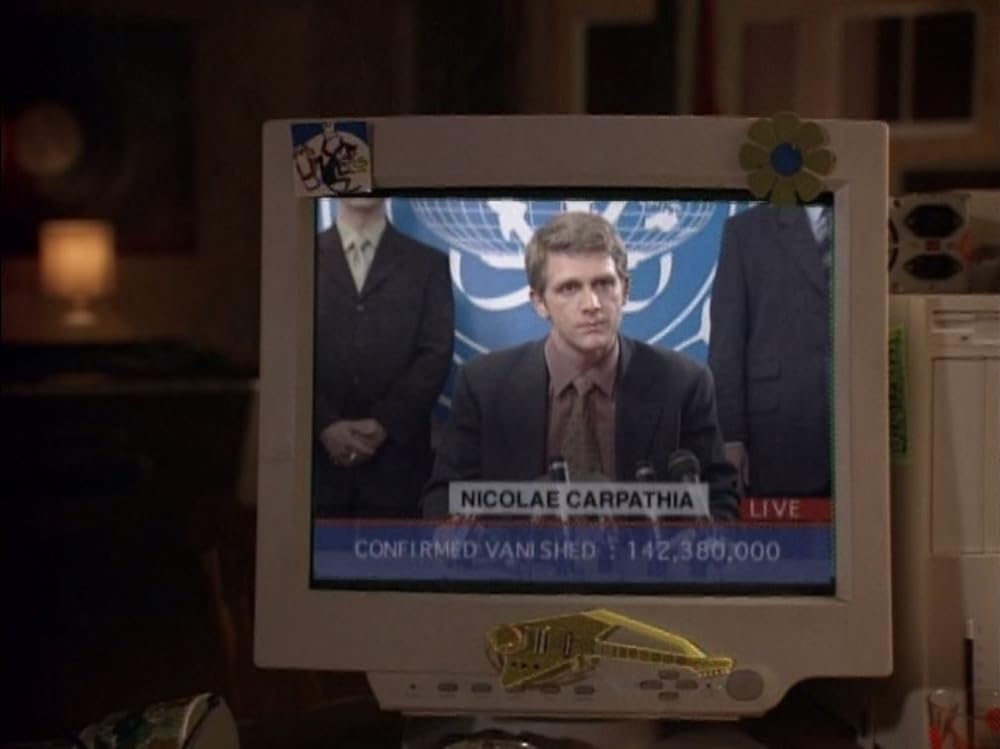
Rounding things out here, it wouldn’t be an IC2S review if I didn’t at least mention the ladies… and they are really poorly served here. Hattie Durham is set up to be important, but she doesn’t really do anything – she ends her affair with Rayford and then goes off to the UN to work with Carpathia. Real riveting stuff… I have no idea why Chelsea Noble was so keen to play her. Then there’s Chloe Steele, whose entire character in this movie is “mad at dad” until the end when she decides that he’s right, they should convert to Christianity. As I recall from reading the books, Chloe does basically nothing important for the entire series and only really exists to be a love interest for Buck. I expect that this probably stems from LaHaye’s regressive views on women (his wife Beverly founded an anti-feminist womens’ organization, Concerned Women for America, which, among other things, advocates for the subservience of women…). As a result, Chloe isn’t allowed to do anything cool, so she just kind of exists on the sidelines.
When it comes down to it, the overarching message of Left Behind doesn’t come across as “You don’t want this to happen to you!” Rather, when Rayford came home and saw his wife’s clothes and her Bible beside the bed, the message became clear to me: “I told you so”. Perhaps it is a consequence of Cloud Ten making this film directly for the Christian market, but Left Behind feels like it’s jerking off its audience, reassuring them that their beliefs are true and, boy, those sinners sure are going to regret not listening to you when this happens to them! It’s not as nakedly spiteful as, say, the God is Not Dead movies, or is it as smugly hateful as Atlas Shrugged, but there doesn’t seem to be much of an effort made into changing hearts and minds as it is saying “Your beliefs will be vindicated, just wait”.
That is all pretty harsh, and like I said, this movie isn’t all that bad. That said, it’s also not exactly great – it is, after all, an adaptation of Left Behind, so it’s always going to be screwed to some degree. As you can see, other than the really poor production values, most of my issues with the film are related to the shitty books and theology it rests upon, which cannot be entirely ignored, but they also aren’t really issues with the film itself. However, it’s not so intrusive in this film that you can’t mostly ignore it, and I think that there is some enjoyment that can be had here with this premise if you’re able to put up with all the bullshit.
5/10 (A very generous rating, if I do say so.)
Be sure to tune in again soon when we look at the next entry in this series, Left Behind II: Tribulation Force!